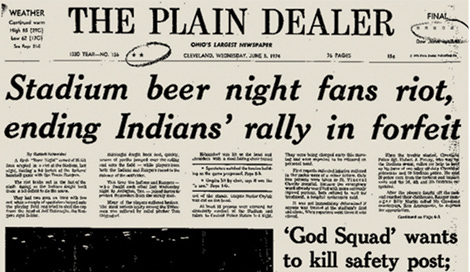Following WWII baseball entered a new world of marketing and entertainment. Bill Veeck, the owner or general manager of three different teams in three decades, the forties, fifties and sixties, was a promotional genius. In 1948 his fun at the ballpark promotions were responsible for increasing the Cleveland Indians attendance to a record 2.6 million. Veeck held promotional events and giveaways at a pace never conceived of before. To name a few of his events:
There were Ladies’ nights at which nylon stockings or orchids were given away.
He held fireworks displays
He was the first to place player names on the back of their uniforms.
He created a nursery in order for mothers to attend games.
He introduced electronic scoreboards to Major League stadiums
In response to a request from fan Joe Early, “why not a night to honor the common fans.” there was the Mr. Average Fan Night - Joe Early.
Benefits were held to raise money for victims of disease or accidents.
In 1948, he signed 40-something-year-old pitcher Satchel Paige to join Larry Doby as the first black ballplayers in the American League
His best-known antic occurred on August 19, 1951. Veeck, then owner of the lowly St. Louis Browns, arranged the stunt. He inserted 3 ft 7 inch tall Eddie Gaedel as a pinch hitter against the Detroit Tigers. Eddie was delivered to home plate in a papier mâché cake. When he emerged, the crowd greeted the little person and his miniature bat with a standing ovation. The pitcher Bob Cain and catcher stood in amazement as he approached the plate. After a consultation on the mound to give Cain time to gain his composure and stop laughing, he walked Gaedel on four consecutive pitches. Veeck had instructed Eddie that under no circumstances should he swing at a pitch. Gaedel trotted down to first base and, in his own words, “I felt like Babe Ruth”. He was replaced with a pinch runner and retired from his baseball career. He was paid $100 for his one at bat appearance. The commissioner of baseball ruled that Veeck violated baseball ethics, and such action would not be permitted in future games.
Veeck opened the door for other great promoters such as Charlie Finley, owner of the Kansas City A’s in the sixties and Ted Turner, owner of the Braves in the nineties.
Finley was the first to dress ballplayers in color uniforms. He also entertained with antics such as having his speedster shortstop Bert Campaneris race a horse to first base. He also had Campaneris play an inning at each position during a nine inning game. He used a donkey named Charlie O to bring in pitchers from the bullpen. He paid his players to grow long mustaches. He brought 60 plus year old Satchel Paige out of retirement for his final game. Ole “Satch” pitched three shutout innings before retiring to a rocking chair by the bullpen.
Turner loved the spotlight and helped build the Braves into America’s team when he showed every game nationwide on his start up television network, Turner Broadcasting System. He entertained fans with ostrich races, bathtub races, weddings at homeplate, and wet t shirt night. Turner raced pitcher Tug McGraw in pushing a baseball with their noses to first base.
There have been promotions that have backfired. Notably was the 1974 10-cent beer night of the Cleveland Indians. The game featured the Indians against the Texas Rangers, who just a week earlier had a rather nasty tussle on the field. As the game and the alcohol consumption rose, an agitated fan base got out of control, throwing firecrackers, beer cups and anything else they could put their hands on at the Ranger players. A couple of fans felt compelled to streak naked across the diamond. The air was filled with the smell of marijuana. In the ninth inning, it exploded, and fans rushed the field. Players had to fight their way off the field. The chief umpire, Nestor Chylak, stopped play and declared the game a forfeit in favor of the Rangers.




